Does Mass Gainer Make You Fat and How to Avoid It?
Author:
Unlock your full potential by engaging with our experts and community! Have questions about your fitness journey or looking for expert advice on weightlifting techniques? Don’t hesitate — leave a comment below and Oleksandr Maksymenko will provide a personalized answer and insights to help you reach your goals.
Torokhtiy is reader-supported. Some links are affiliate links, and we may earn a commission at no extra cost to you. See our disclosure page for details.
In this article, we discuss does mass gainer make you fat and how to use this type of supplement to prevent it. You will also learn what to focus on when choosing a suitable product. Stay with us until the end to find out what is the key factor that determines will mass gainer make you fat or not.
Does mass gainer make you fat? This is possible if you follow a high calorie surplus diet. However, will mass gainer make you fat depends on how you plan your diet, whether you control the magnitude of calorie surplus, and whether you make changes if you gain too much fat.
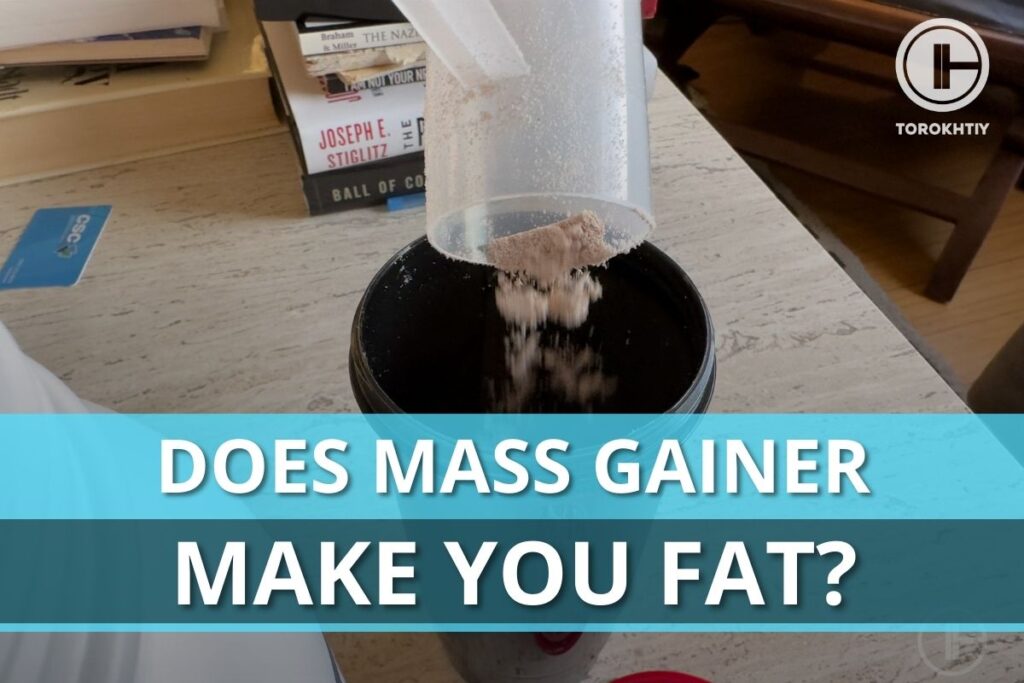
Does Mass Gainer Make You Fat?
Mass gainers have a somewhat controversial reputation, because they are actually the most caloric dense type of supplement of all.The classic gainer contained a large or even huge amount of carbohydrates.
However, there is now a wide variety of mass gainers on the market, with different ratios of carbohydrates to protein, as well as different amounts of fat per serving. Therefore, if you choose and use this supplement wisely, you can achieve your goals without losing sleep worrying about will mass gainer make you fat.
Under What Conditions Does the Gainer Contribute to Fat Gain?
Body weight regulation is a complex process in which the nervous, endocrine and metabolic signals that interact with the environment are actively involved. However, the key factor that decides in which direction the weight moves and whether we gain or lose fat mass is the number of calories ingested and their ratio to the calories expended.
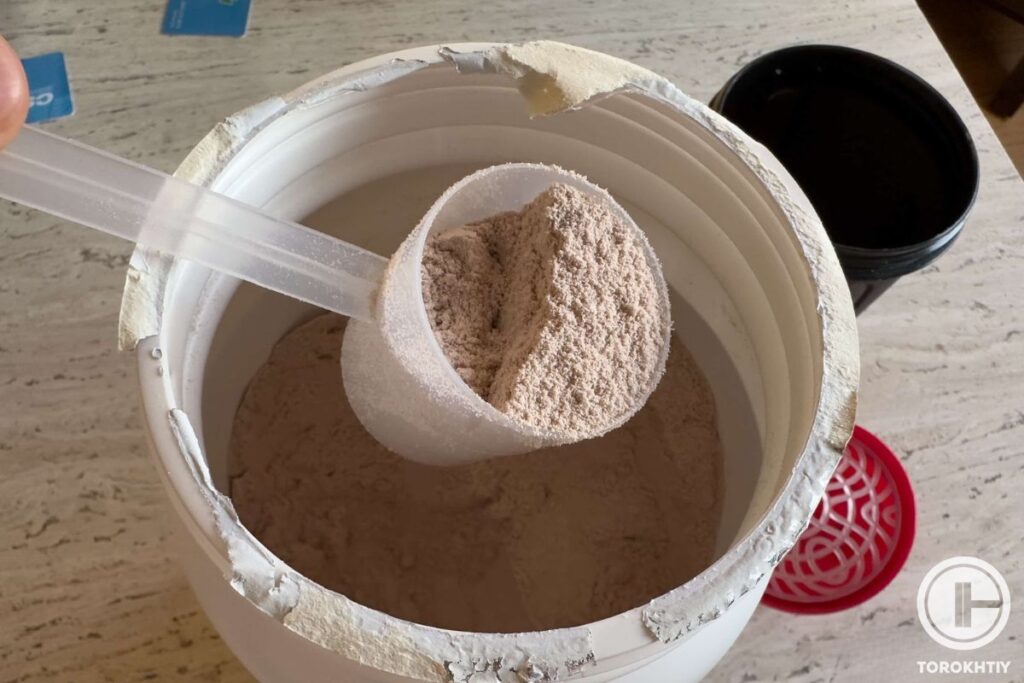
In other words, if the intake of calories from food and caloric beverages exceeds the expenditure of calories, we gain weight and increase body fat stores. Therefore, consuming any whole food or supplement with macronutrients (carbohydrates, protein, and fat) in the context of general overeating will lead to weight and fat gain.
Gainer is not a supplement that somehow uniquely causes fat gain. However, given the fact that it is a supplement with a high or very high calorie density (depending on the specific product), its use makes it easier to overeat and, as a result, gain fat.
Special Topic. Does mass gainer increase belly fat?
The fact is that genetics (heredity) is a key factor that affects the distribution of body fat in our body. Gender is also a significant influencing factor, because adipose tissue is more likely to accumulate in the central region in men, whereas in women it is preferentially accumulated in hips and thighs. Also, the distribution of fat in the body is influenced by race, age, sleep, stress, diet composition and other factors.
My point is that in conditions of overeating, your genetics and gender primarily determine how much fat will accumulate in the abdominal area. Genetically determined fat distribution will occur regardless of whether you use a gainer at all.
So, in general, if you have a certain genetic makeup, and especially if you are a man, belly fat can accumulate with particular enthusiasm. Whether you use a weight gainer supplement or you have never heard of it.
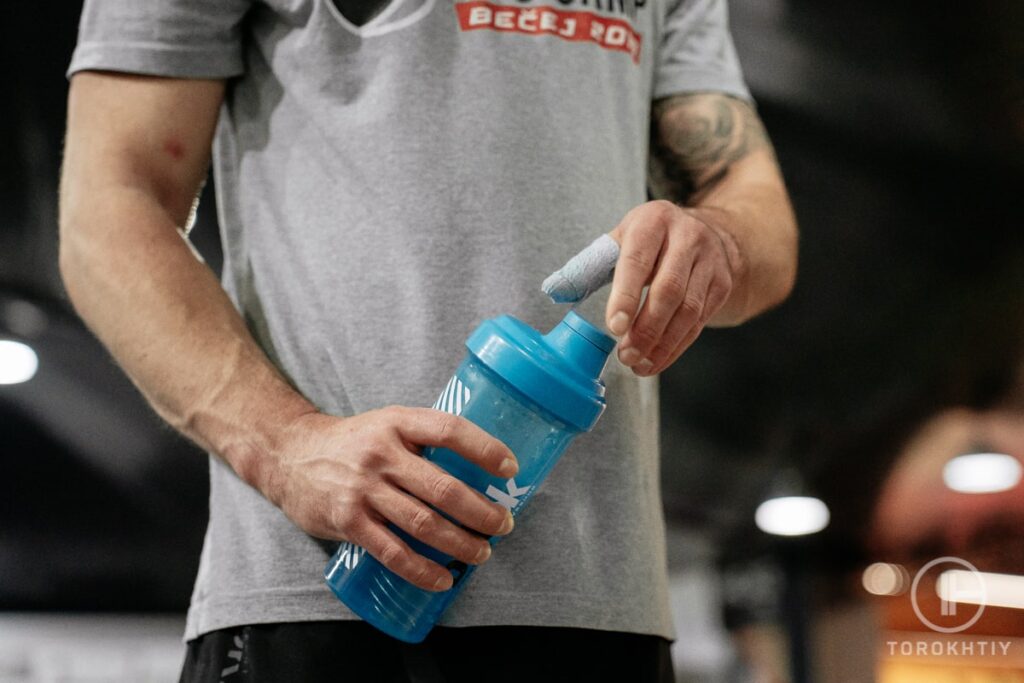
We can only partially influence the distribution of fat in the body (in a positive way), for example, by improving sleep and reducing stress. Also, a randomized controlled trial demonstrated that, despite comparable weight gain under conditions of overeating, saturated fat led to twice as much visceral fat accumulation as polyunsaturated fat.
Therefore, it is better to pay special attention to the sources of fat in your diet. Prefer fatty fish, chia seeds, flax seeds, walnuts, as well as olive oil, flaxseed oil, avocado and peanut butter with low to no added sodium.
How to Use a Mass Gainer to Minimize Fat Gain
1. Understand How Much You Eat
If you are wondering “Can mass gainer make you fat”, the answer is yes, provided it is part of a hypercaloric diet. Therefore, to minimize fat gain while gaining muscle mass, you need to understand what your caloric needs are.
First, you need to calculate the caloric needs to maintain your current weight, and then add another ~5-20%. In this way, you will create a moderate calorie surplus, which, together with a well-planned diet and strength training program, will allow you to gain lean mass with less fat gain.
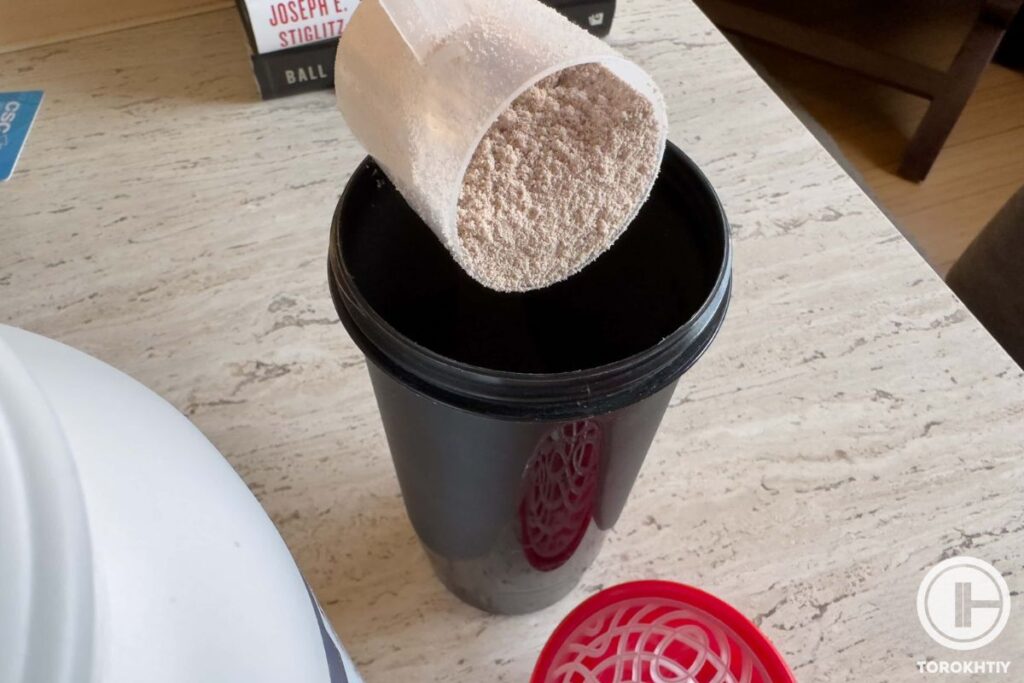
If you’re new to strength training or relatively untrained, stick closer to 10-20% caloric surplus, because a larger surplus is better suited for untrained individuals who are primed for more dramatic progress in lean mass gain. If you have a lot of training experience and already built a lot of muscle, stick closer to the lower range, say ~5-10% caloric surplus.
2. Avoid Aggressive Calorie Surplus and Dirty Bulking
The concept of dirty bulking (which can also be called “see food diet”, which means “i see food and i eat it”) should remain in the past. Adding more calories to an already sufficient surplus will not lead to more muscle gain, but will lead to more fat gain. And the more aggressive the surplus, the more fat you will gain.
In general, you need to organize your meal plan so that the gainer fits into the caloric intake with a moderate calorie surplus. And also make sure that you consume 1.6-2.2 g of protein per 1 kg of body weight per day. This range is optimal for maximizing the increase in muscle mass in combination with resistance exercise.
3. Choose a Gainer With a Moderate to Low Carb-To-Protein Ratio per Serving
There are various macronutrient gainer formulations on the market. One well-known and popular mass gainer contains 50 g of protein and 252 g of carbohydrates per serving, which is indicated by the manufacturer. In this case, the ratio of carbohydrates to protein is ~5:1. The total caloric content of one serving is 1250 kcal.
However, there are supplements with a lower carb to protein ratio, such as 3:1 or 2:1, and these products are generally a more optimal choice for lean bulk.
4. Adjust Caloric Intake Based on the Rate of Weight and Fat Gain
A small to moderate energy surplus should only be used as your starting point. However, conclusions about whether such a caloric intake is suitable for you or not should be made based on the changes you observe in real life. At the end of the day, a formula is just a formula.
During the period of gaining muscle mass, you should have guidelines that will help you understand whether you are moving in the right direction in the context of the calorie intake that you are following. Based on a scientific review that focuses on nutrition recommendations for bodybuilders, the recommended rate of weight gain is as follows:
- A guideline for beginners and intermediates in strength training is weight gain of ~0.25-0.5% of body weight per week.
- A guideline for experienced trainees in strength training is weight gain of ~0.25% of body weight per week.
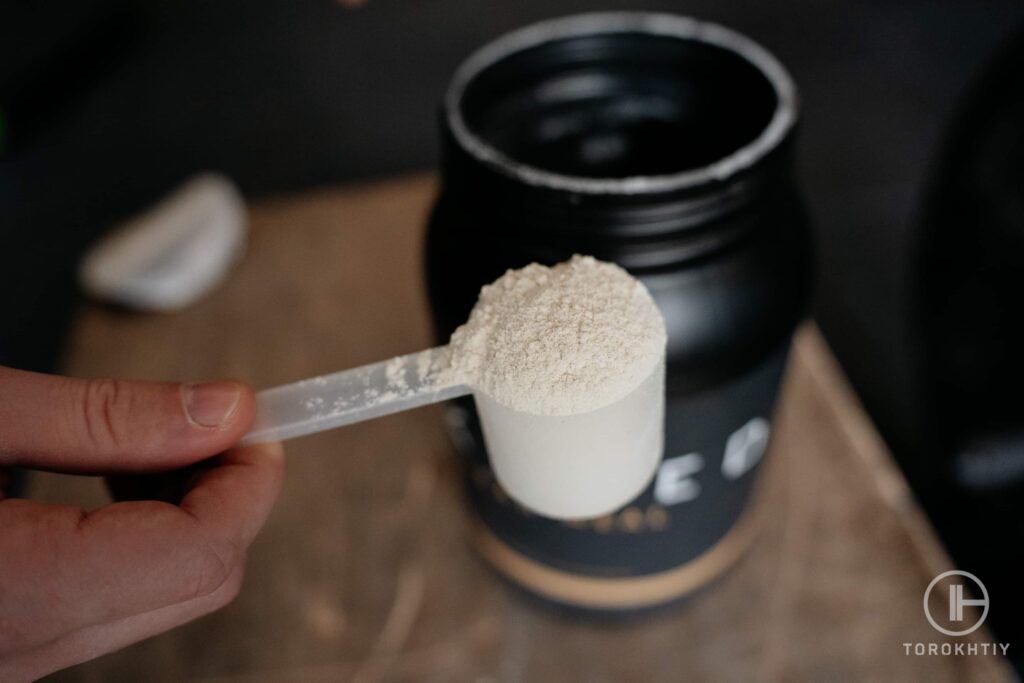
However, remember that we are all different, so for some beginners, gaining 0.5% of body weight per week can lead to a significant increase in fat mass. While some experienced trainees can go beyond 0.25% of body weight per week without significant deterioration of body composition. In any case, you will have to make adjustments in caloric intake based on changes in body composition that will occur in real life.
The key recommendation is if you gain too much body fat, you need to cut calories by ~100 and continue to monitor changes. If the weight stands still and/or you do not observe an increase in strength, you need to add ~100 kcal and monitor the changes. This juggling with calories will help you find your sweet spot.
Keep in mind that starting a bulking phase with a relatively high body fat percentage is not a good idea. In this case, it is better to lose fat first, and only then start the muscle building cycle.
To summarize, for muscle gain with minimal fat gain, I recommend:
- Choose gainers with a carb-to-protein ratio of 1:1, 2:1, or 3:1. For reference, the optimal choice can be gainers, which contain ~50-55 g of protein and ~100-120 g of carbohydrates per serving. You can also reduce the serving to get ~25-40 g of protein.
- Incorporate 1 serving of the gainer into a well-organized meal plan with a small to moderate energy surplus.
You can also make a gainer using a protein supplement. This option looks even better, because in this case you will get your carbs from whole foods. Simply mix low-fat milk with a scoop of protein powder, add one and a half ripe bananas (choose a large one) and unsalted peanut butter.
Transparent Labs Whey Protein Isolate
- Serving Size: 32.96 grams
- Price Per Serving: ~$1.8
- Protein Percent Of Weight (%): 85%
- Proteins: 28 grams
- Carbohydrates: 1 gram (depends on flavor)
- Fat: 0.5 gram (French Vanilla only)
- Added Sugar: 0 gram
- Calories Per Serving: 120
- Recommended By Athletes: Hafþór Júlíus Björnsson, Terron Beckham, Paul Sklar
I recommend Whey Protein Isolate from Transparent Labs. This protein has a high percentage of protein per serving and is certified by Informed Choice/Protein. To save the budget, it is better to choose a large package.
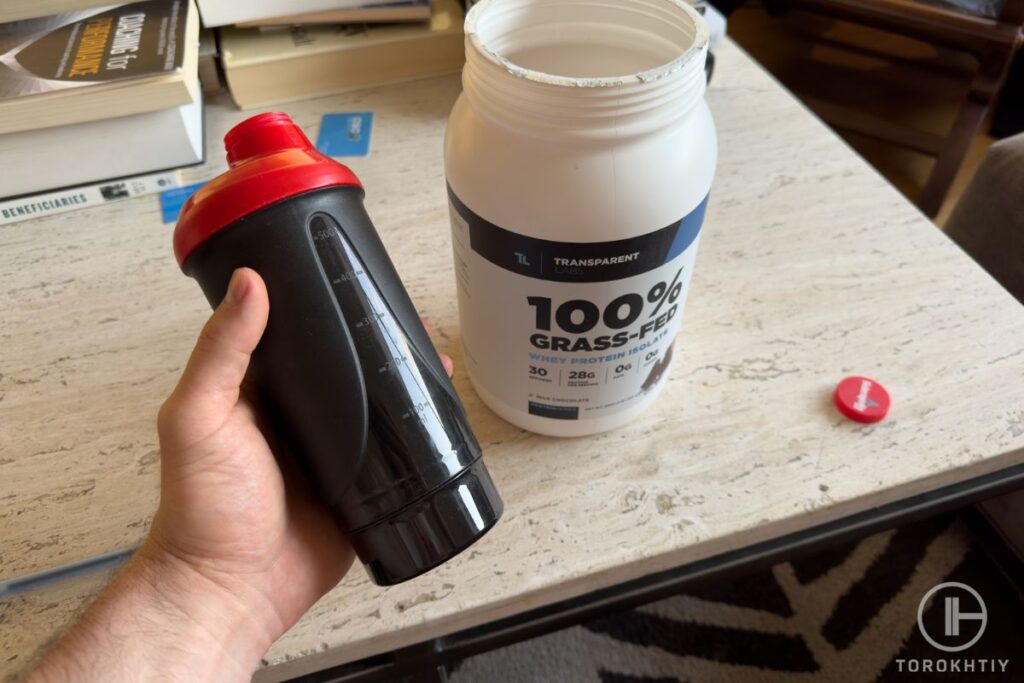
FAQ
Does Mass Gainer Build Muscle or Just Fat?
In order to build lean muscle mass, you need strength training with progressive overload, a small to moderate calorie surplus, enough protein and patience. If a weight gainer is part of a low to moderate energy surplus meal plan, then it will promote muscle gain and minimal fat gain. Don’t forget to make caloric adjustments if you’re gaining too much fat.
Is Mass Gainer Good for Skinny Guys?
Yes, because it is a supplement with the highest calorie density. Since skinny guys most often have problems with consuming the required amount of carbohydrates and calories, a mass gainer can be a great addition to a well-planned diet. For very skinny guys, a gainer with a 4:1 or 5:1 carb to protein ratio might be the best option.
Is It Ok to Drink Mass Gainer Everyday?
If you are not able to get the needed amount of calories and carbs from whole foods, then the gainer can be used daily. However, I would recommend planning your diet so that you get the absolute majority of your calories and carbs from whole foods, and leave the gainer as a backup option. For example, you can use a serving of gainer every other day.
Conclusion
So, can mass gainer make you fat? Yes, if it’s part of a high-calorie diet plan where you binge on calories. However, with proper diet planning, weekly tracking of weight gain and appropriate caloric adjustments, this supplement will help you gain muscle mass with minimal fat gain. Remember that you can gain a lot of fat even without a gainer, because it primarily comes down to the total calorie content of your diet.
Have you ever tried a gainer? Tell us about your experience in the comments!
Also read:
- Is Oatmeal Good for Bulking
- Is Pasta Good for Bulking
- Is Pizza Good for Bulking
- Is Rice Good for Bulking
- Dirty Bulking
- When Is Bulking Season
References:
- K.D. Hall et al., “The energy balance model of obesity: beyond calories in, calories out”, Am J Clin Nutr, 2022 May,
- S. Howell, R. Kones “Calories in, calories out” and macronutrient intake: the hope, hype, and science of calories”, Am J Physiol Endocrinol Metab, 2017 Nov 1;313(5),
- C. Sun et al., “Genetics of Body Fat Distribution: Comparative Analyses in Populations with European, Asian and African Ancestries”, Genes (Basel), 2021 Jun; 12(6),
- K. Karastergiou et al., “Sex differences in human adipose tissues – the biology of pear shape”, Biol Sex Differ, 2012; 3,
- “Body Fat”, Harvard T.H. Chan School of Public Health (https://www.hsph.harvard.edu/nutritionsource/healthy-weight/measuring-fat/, accessed December 27, 2023),
- A.A. Aragon, B.J. Schoenfeld et al., “International society of sports nutrition position stand: diets and body composition”, J Int Soc Sports Nutr, 2017 Jun,
- T. Stokes, A.J. Hector et al., “Recent Perspectives Regarding the Role of Dietary Protein for the Promotion of Muscle Hypertrophy with Resistance Exercise Training”, Nutrients. 2018 Feb; 10(2),
- J. Iraki et al., “Nutrition Recommendations for Bodybuilders in the Off-Season: A Narrative Review”, Sports (Basel). 2019 Jul; 7(7),
- F. Rosqvist et al., “Overfeeding Polyunsaturated and Saturated Fat Causes Distinct Effects on Liver and Visceral Fat Accumulation in Humans”, Diabetes 2014;63(7).
Why Trust Us?
With over 20 years in Olympic weightlifting, strength training, nutrition coaching, and general fitness our team does its best to provide the audience with ultimate support and meet the needs and requirements of advanced athletes and professional lifters, as well as people who strive to open new opportunities and develop their physical capabilities with us.
By trusting the recommendations of our certified experts in coaching, nutrition, and sports training programming, as well as scientific consultants, and physiotherapists, we provide you with thorough, well-considered, and scientifically proven content. All the information given in the articles concerning workout programming, separate exercises, and athletic performance, in general, is based on verified data.
The product testing process is described in more detail here.
Author: Oleksandr Maksymenko
Certified Sports Nutritionist,
MSc Sports Dietetics
Specializing in: Weight management, Fitness / Sports nutrition
Oleksandr is a professional fitness nutritionist certified by the Fitness Professional Association (FPA). He follows the principles of evidence-based dietetics and fosters a healthy relationship with food in his clients, ensuring there are no strict prohibitions on their favorite foods or frequent lapses. His primary goal is not only to achieve results for you but also to sustain them over the long term, all while enjoying tasty and delicious food.



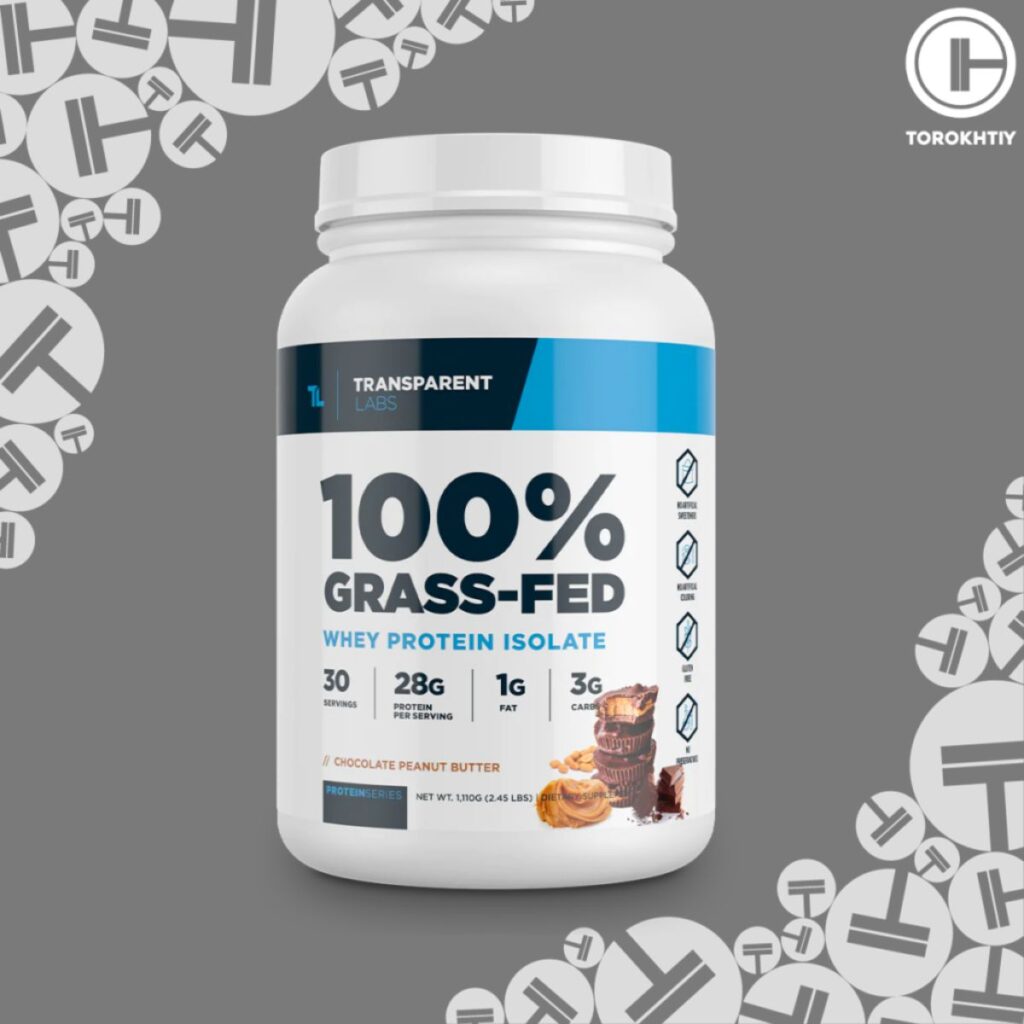
Still have questions after reading our article? Unlock your full potential by engaging with our experts and community! Don’t hesitate — leave a comment below and Oleksandr Maksymenko will provide a personalized answer and insights to help you reach your goals.